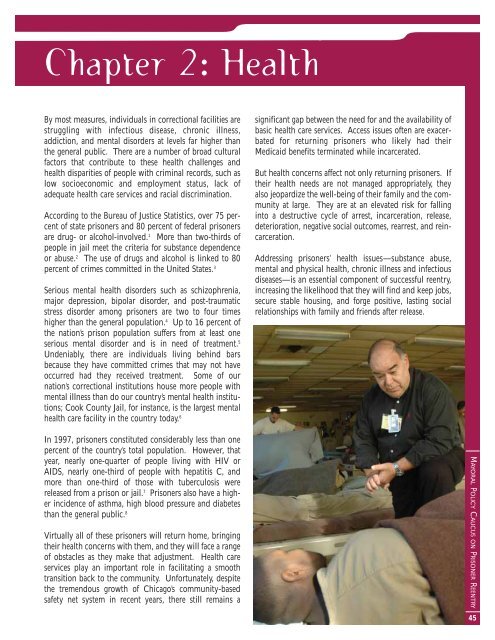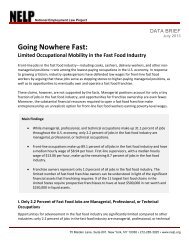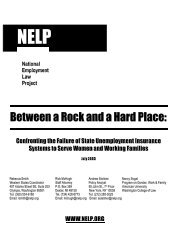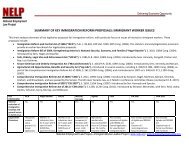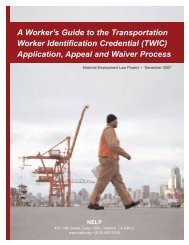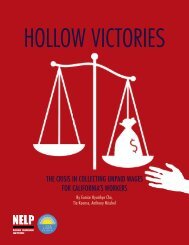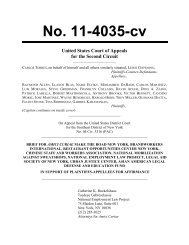Rebuilding Lives. Strengthening Communities.
Rebuilding Lives. Strengthening Communities.
Rebuilding Lives. Strengthening Communities.
Create successful ePaper yourself
Turn your PDF publications into a flip-book with our unique Google optimized e-Paper software.
Chapter 2: Health<br />
By most measures, individuals in correctional facilities are<br />
struggling with infectious disease, chronic illness,<br />
addiction, and mental disorders at levels far higher than<br />
the general public. There are a number of broad cultural<br />
factors that contribute to these health challenges and<br />
health disparities of people with criminal records, such as<br />
low socioeconomic and employment status, lack of<br />
adequate health care services and racial discrimination.<br />
According to the Bureau of Justice Statistics, over 75 percent<br />
of state prisoners and 80 percent of federal prisoners<br />
are drug- or alcohol-involved. 1 More than two-thirds of<br />
people in jail meet the criteria for substance dependence<br />
or abuse. 2 The use of drugs and alcohol is linked to 80<br />
percent of crimes committed in the United States. 3<br />
Serious mental health disorders such as schizophrenia,<br />
major depression, bipolar disorder, and post-traumatic<br />
stress disorder among prisoners are two to four times<br />
higher than the general population. 4 Up to 16 percent of<br />
the nation’s prison population suffers from at least one<br />
serious mental disorder and is in need of treatment. 5<br />
Undeniably, there are individuals living behind bars<br />
because they have committed crimes that may not have<br />
occurred had they received treatment. Some of our<br />
nation’s correctional institutions house more people with<br />
mental illness than do our country’s mental health institutions;<br />
Cook County Jail, for instance, is the largest mental<br />
health care facility in the country today. 6<br />
significant gap between the need for and the availability of<br />
basic health care services. Access issues often are exacerbated<br />
for returning prisoners who likely had their<br />
Medicaid benefits terminated while incarcerated.<br />
But health concerns affect not only returning prisoners. If<br />
their health needs are not managed appropriately, they<br />
also jeopardize the well-being of their family and the community<br />
at large. They are at an elevated risk for falling<br />
into a destructive cycle of arrest, incarceration, release,<br />
deterioration, negative social outcomes, rearrest, and reincarceration.<br />
Addressing prisoners’ health issues—substance abuse,<br />
mental and physical health, chronic illness and infectious<br />
diseases—is an essential component of successful reentry,<br />
increasing the likelihood that they will find and keep jobs,<br />
secure stable housing, and forge positive, lasting social<br />
relationships with family and friends after release.<br />
In 1997, prisoners constituted considerably less than one<br />
percent of the country’s total population. However, that<br />
year, nearly one-quarter of people living with HIV or<br />
AIDS, nearly one-third of people with hepatitis C, and<br />
more than one-third of those with tuberculosis were<br />
released from a prison or jail. 7 Prisoners also have a higher<br />
incidence of asthma, high blood pressure and diabetes<br />
than the general public. 8<br />
Virtually all of these prisoners will return home, bringing<br />
their health concerns with them, and they will face a range<br />
of obstacles as they make that adjustment. Health care<br />
services play an important role in facilitating a smooth<br />
transition back to the community. Unfortunately, despite<br />
the tremendous growth of Chicago’s community-based<br />
safety net system in recent years, there still remains a<br />
MAYORAL POLICY CAUCUS ON PRISONER REENTRY<br />
45


